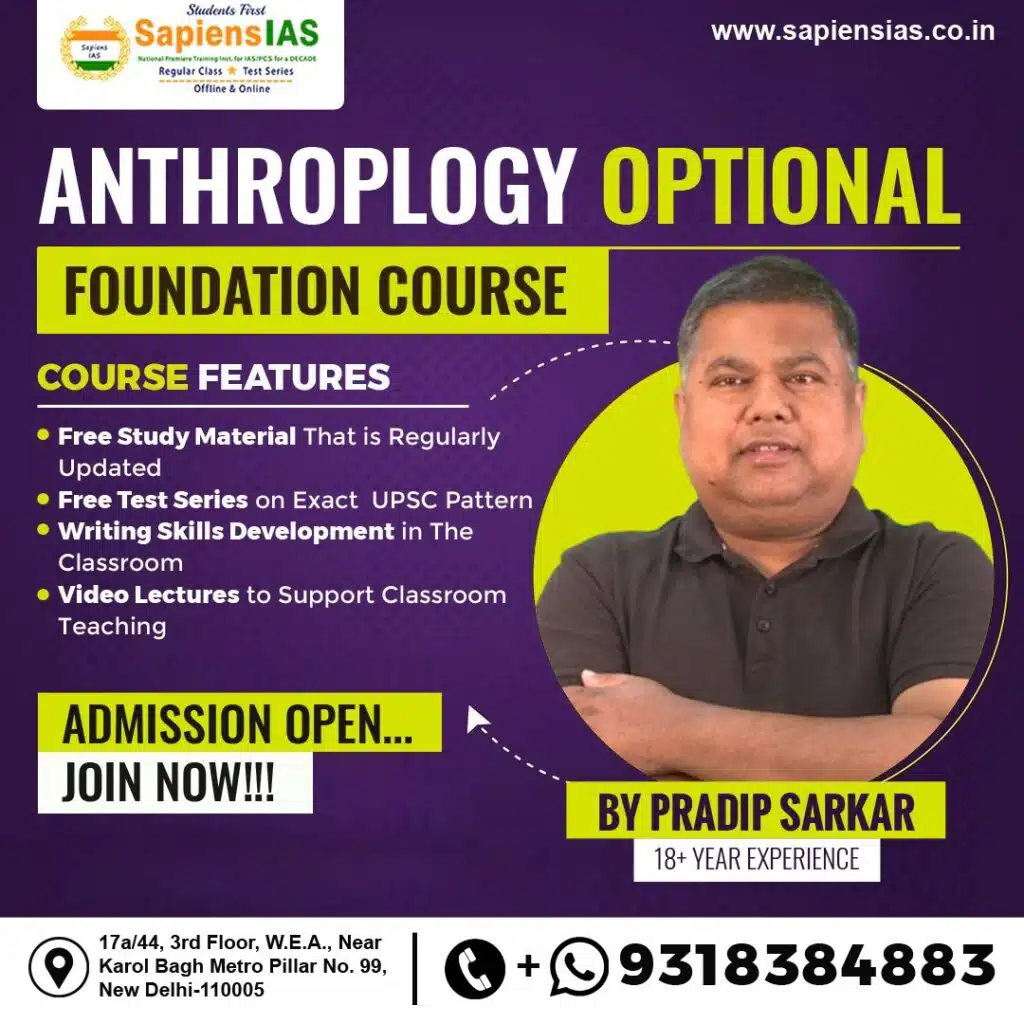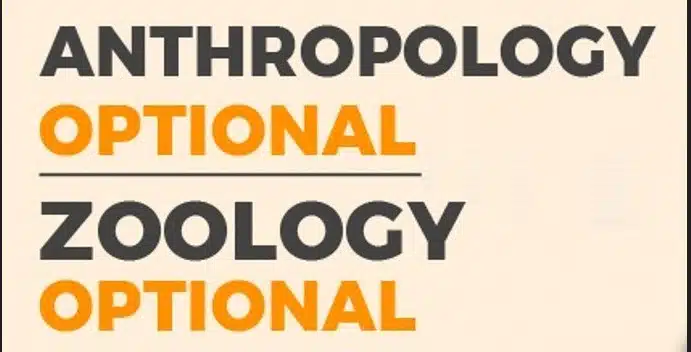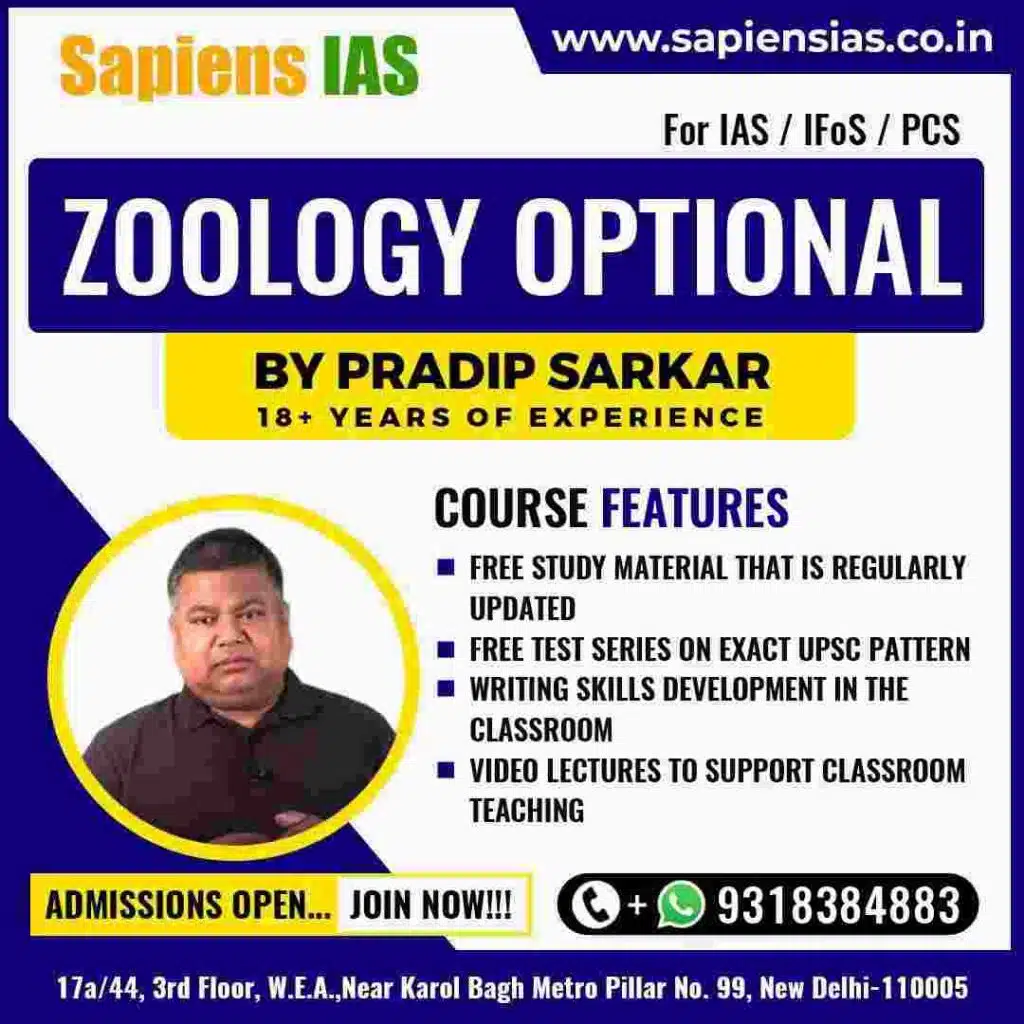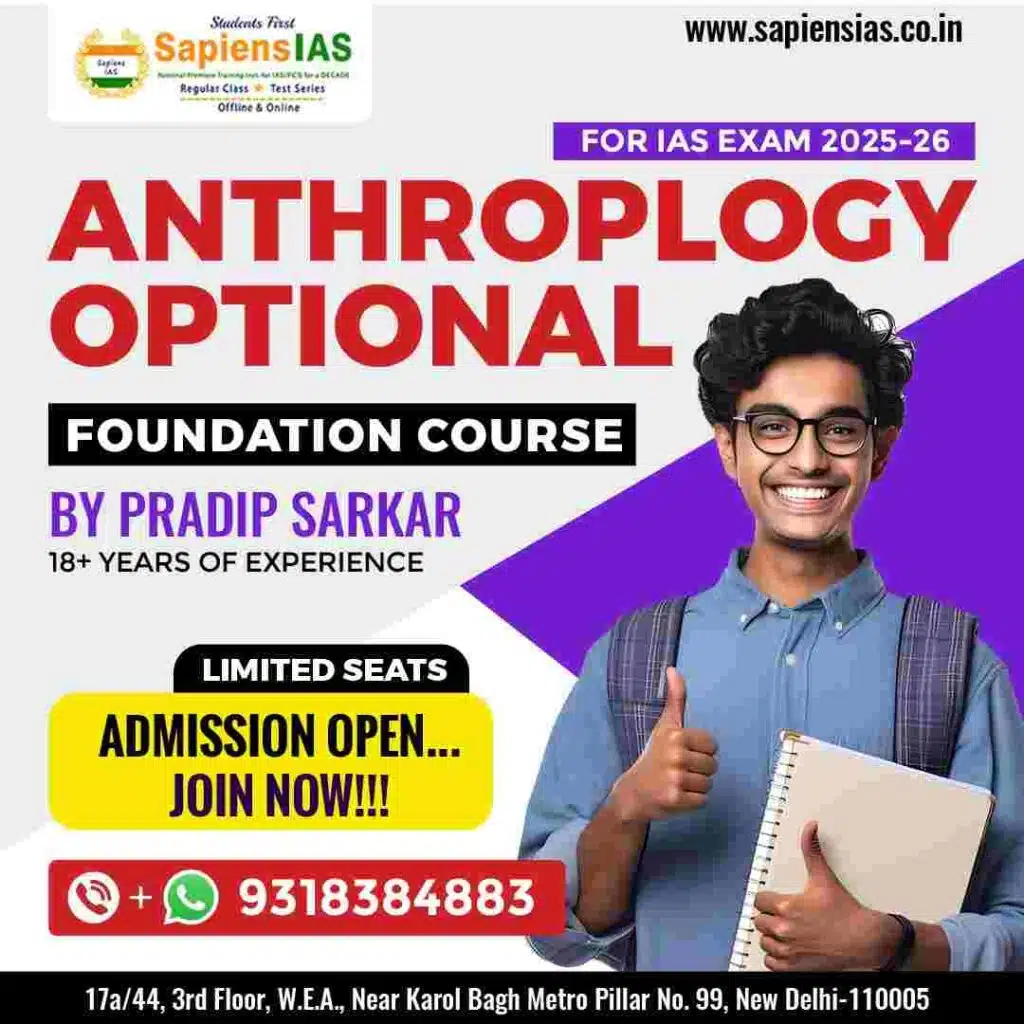Choosing the perfect optional subject is one of the most critical decisions in UPSC. So, one common question that many aspirants ask is “which optional subject has the shortest syllabus in UPSC?” with high-scoring potential and a manageable syllabus.
Table of Contents
ToggleIn this blog post, we will discuss on which optional subject has the smallest syllabus in UPSC and why anthropology stands out as a smart choice as an optional paper in mains under the expert guidance of Pradip Sir at Sapiens IAS.
Which Optional Subject Has Less Syllabus for UPSC IAS Mains
UPSC offers 48 optional subjects for the CSE/IAS Mains exam and among them, anthropology has a short syllabus, high-scoring opportunities and focused content. Anthropology with its manageable syllabus helps you reduce the study burden and increase your chances of success.
Top 10 Optional Subjects with the Least Syllabus in UPSC
The optional subject which has the least syllabus in UPSC, provides exact information is difficult. However, anthropology is usually considered one of the shortest optional subject for UPSC.
Here are the top 10 optional subjects in UPSC with the least syllabus:
- Anthropology
- Sociology
- Philosophy
- Public Administration
- Zoology
- Political Science and IR
- Geography
- History
- Psychology
- Literature of any language
How is Anthropology as an Optional for IAS?
The speciality of Anthropology in UPSC optional is the clarity and consistency in the UPSC question patterns. It is the optional subject which optional has the least syllabus in UPSC. So, you won’t be surprised by seeing the anthropology question paper.
The question patterns are answers are mostly known and UPSC hasn’t improvised anything to date. Along with that, the questions tend to repeat. So, if you go through the previous year’s anthropology optional papers you’ll get a handful of questions that are coming again for sure.
Why Anthropology Stands Out as a Best Optional Paper in UPSC
Anthropology is one of the “best optional subject for UPSC with short syllabus” and high-scoring potential. Many candidates have scored 300+ and 350+ marks in anthropology optional. For example at Sapiens IAS, Nipun Aggarwal achieved 329 marks in anthropology under the guidance of Pradip Sarkar.
Now, let’s discuss some key reasons why anthropology stands out as a top optional paper for UPSC with smallest syllabus:
Manageable Syllabus:
The syllabus for anthropology is smaller in comparison to many other optional subjects.
Shorter Time for Completion:
Anthropology’s syllabus can be completed in a relatively short amount of time.
Overlap with GS Papers:
Anthropology overlaps with GS papers, particularly in areas like society, culture and human evolution.
High Success Rate:
Anthropology is one of the most scoring optional subjects in IAS mains.
Availability of Study Material:
Availability of quality study material and mentorship for anthropology help you with easy preparation.
Anthropology Optional Syllabus for UPSC Mains Exam
Anthropology optional subject has the shortest syllabus for UPSC. Before you think Anthropology is the subject you should choose, let’s understand the subject briefly.
Anthropology Optional Syllabus for UPSC: Paper 1
- Meaning, Scope, and Development of Anthropology: Study of human beings and their societies from a holistic perspective.
1.1) Relationships with Other Disciplines: Interdisciplinary connections with sociology, psychology, biology, history, and linguistics.
1.2) Main Branches of Anthropology and Their Scope: Physical Anthropology, Archaeological Anthropology, and Social/Cultural Anthropology.
1.3) Human Evolution and the Emergence of Man: Study of human evolution, hominid fossils, and the emergence of modern humans.
1.4) The Biological Basis of Life: Examination of genetics, human growth and development, and the biological aspects of human life.
1.5) Principles of Prehistoric Archaeology: Study of archaeological investigation, principles, and chronology of prehistoric cultures.
1.6) Cultural Evolution: Analysis of cultural changes and transformations across time and societies.
2) Nature of Culture, Society, Marriage, Family, and Kinship: Exploration of culture, society, marriage, family, kinship, and their variations in different cultures.
3) Economic Organization: Study of economic systems, modes of production, exchange, and consumption in societies.
4) Political Organization and Social Control: Analysis of political systems, governance structures, power relations, and mechanisms of social control.
5) Religion: Examination of religious beliefs, practices, rituals, and their cultural significance.
6) Anthropological Theories: Study of various theoretical perspectives used in anthropology, including evolutionism and functionalism.
7) Culture, Language, and Communication: Exploration of the relationship between culture, language, and patterns of communication.
8) Research Methods in Anthropology: Utilization of methods such as participant observation, interviews, surveys, and data analysis.
9) Human Genetics: Study of genetics and its application to understanding human variation and genetic diseases.
10) Concept of Human Growth and Development: Examination of the processes and factors influencing human growth and development.
11) Relevance of Menarche, Menopause, and Other Bioevents: Study of the implications of menarche, menopause, and biological milestones for fertility patterns and differentials.
12) Applications of Anthropology: Practical applications of anthropological insights in fields such as development, public health, and policy-making.
Anthropology Optional Syllabus for UPSC: Paper 2
- Evolution of the Indian Culture and Civilization: Prehistoric (Palaeolithic, Mesolithic, Neolithic and Neolithic-Chalcolithic), Protohistoric (Indus Civilization). Pre-Harappan, Harappan and post- Harappan cultures. Contributions of the tribal cultures to Indian civilization.
- Palaeo—Anthropological evidences from India with special reference to Siwaliks and Narmada basin (Ramapithecus, Sivapithecus and Narmada Man).
- Ethno-archaeology in India: The concept of ethnoarchaeology; Survivals and Parallels among the hunting, foraging, fishing, pastoral and peasant communities including arts and crafts producing communities.
- Demographic profile of India: Ethnic and linguistic elements in the Indian population and their distribution. Indian population—factors influencing its structure and growth.
- The structure and nature of traditional Indian social system—Varnashram, Purushartha, Karma, Rina and Rebirth.
- Caste system in India— Structure and characteristics Varna and caste, Theories of origin of caste system, Dominant caste, Caste mobility, Future of caste system, Jajmani system. Tribe-case continuum.
- Sacred Complex and Nature-Man-Spirit Complex.
- Impact of Buddhism, Jainism, Islam and Christianity of Indian society.
- Emergence, growth and development in India— Contributions of the 18th, 19th and early 20th Century scholar-administrators. Contributions of Indian anthropologists to tribal and caste studies.
- Indian Village: Significane of village study in India; Indian village as a social system; Traditional and changing patterns of settlement and inter-caste relations; Agrarian relations in Indian villages; Impact of globalization on Indian villages.
- Linguistic and religious minorities and their social, political and economic status.
- Indigenous and exogenous processes of socio-cultural change in Indian society: Sanskritization, Westernization, Modernization; Inter-play of little and great traditions; Panchayati Raj and social change; Media and Social change.
- Tribal situation in India—Bio-genetic variability, linguistic and socio-economic characteristics of the tribal populations and their distribution.
- Problems of the tribal Communities: Land alienation, poverty, indebtedness, low literacy, poor educational facilities, unemployment, under-employment, health and nutrition.
- Developmental projects and their impact on tribal displacement and problems of rehabilitation. Development of forest policy and tribals. Impact of urbanisation and industrialization on tribal populations.
- Problems of exploitation and deprivation of Scheduled Castes, Scheduled Tribes and Other Backward Classes. Constitutional safeguards for Scheduled Tribes and Scheduled Castes.
- Social change and contemporary tribal societies : Impact of modern democratic institutions, development programmes and welfare measures on tribals and weaker sections.
- The concept of ethnicity; Ethnic conflicts and political developments; Unrest among tribal communities; Regionalism and demand for autonomy; Pseudo-tribalism. Social change among the tribes during colonial and post-independent India.
- Impact of Hinduism, Buddhism, Christianity, Islam and other religions on tribal societies.
- Tribe and nation-state—a comparative study of tribal communities in India and other countries.
- History of administration of tribal areas, tribal policies, plans, programmes of tribal development and their implementation. The concept of PTGs (Primitive Tribal Groups), their distribution and special programmes for their development. Role of N.G.O.s in tribal development.
- Role of anthropology in tribal and rural development.
- Contributions of anthropology to the understanding of regionalism, communalism and ethnic and political movements.
Why Choose Sapiens IAS for Anthropology Optional Preparation?
Sapiens IAS is a prominent coaching for anthropology optional preparation under the expert anthropology optional faculty Pradip Sarkar. The institute produces high scorers in anthropology every year by providing an anthropology optional foundation course.
Experienced Faculty:
Pradip Kumar Sarkar with 18 years experience in anthropology, provides clear and focused teaching.
Comprehensive Course:
The anthropology optional course covers both paper 2 and paper 2, ensuring no important topics are missed.
High-Quality Study Materials:
The institute provides high-quality, structured and concise study materials for anthropology.
Proven Track Record:
Sapiens IAS has a history of producing top scorers and successful candidates with high marks in anthropology.
Personalized Attention:
The institute provides one-to-one individual mentorship to improve your preparation strategy and answer writing skills.
Sign Up to Score Higher Better Faster
Conclusion
If you are looking for the optional has the least syllabus in UPSC, anthropology stands as one of the best options. Under the expert guidance of Pradip Kumar Sarkar at Sapiens IAS, you can complete the syllabus efficiently and opportunity to score 300+ marks in anthropology optional.
Frequently Asked Questions on UPSC Optional Subject with Less Syllabus
Anthropology has the least syllabus for the CSE/IAS mains compared to other UPSC optional subjects.
Anthropology is one of the easiest optional subjects for UPSC mains of its straightforward question pattern, manageable and short syllabus.
Anthropology and Sociology both subjects are scoring, but anthropology offers a better chance for higher scores due to its objective and scientific nature.
Anthropology is regarded as one of the subjects with the smallest course of study in the UPSC optional list.
Anthropology is widely recognized for having one of the shortest and most focused syllabus among UPSC optional subjects.
Anthropology has a good track record as a high success rate optional subject in UPSC/IAS exam. Following are the 5 most scoring optional subjects for UPSC exam:
- Anthropology
- Sociology
- Philosophy
- Public Administration
- Zoology.









